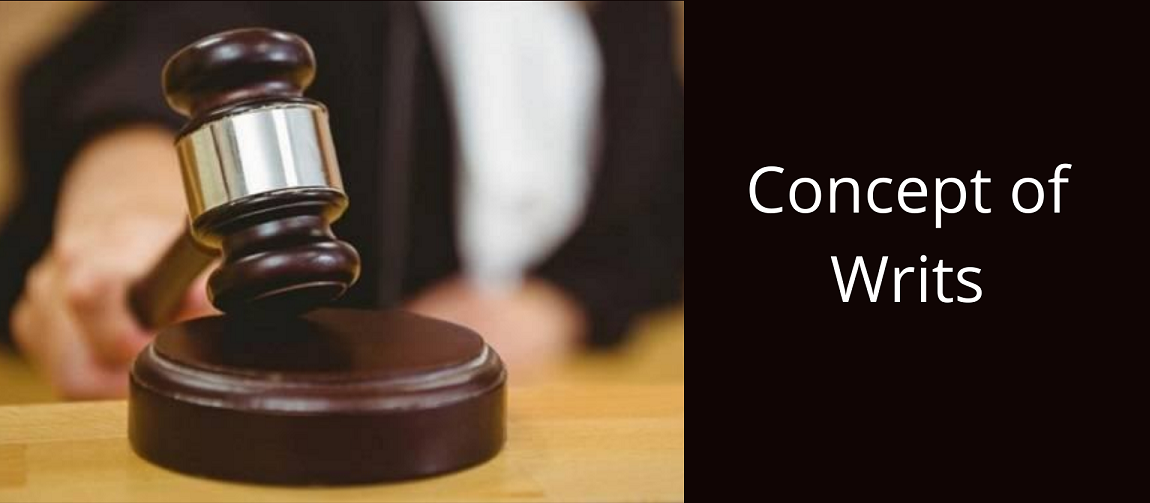The concept of Writs is ingrained in the Constitution of India

The concept of Writs is ingrained in the Constitution of India under Part - III, for the purpose of securing to all people in India, their fundamental human rights that are considered integral for a dignified life. A Writ is nothing but a written Order from the Hon’ble Supreme Court or any of the 25 High Courts of this country that commands Constitutional remedies for the Indian populace against the violation of their Fundamental Rights. The Constitution of India not only declares these rights but also provides for their enforcement, which in itself is a Fundamental Right under Article 32 of the Constitution, as well as remedies for enforcement of the other Fundamental Rights. Even though the violation of Fundamental Rights can only be invoked against the action or omission on part of the State, as defined under Article 12 of the Indian Constitution, however, there are certain exceptions to this Rule. There are five kinds of Writs that the Constitution has contemplated:-
The Constitution empowers the Hon’ble Supreme Court, as well as all the High Courts of the country to issue a Writ against the State for the protection of the Fundamental Rights of the people and thus, any aggrieved person can approach either of the Courts directly for the declaration thereof. Therefore, any person whose Fundamental Right may have been infringed by any action or inaction of the State can directly approach the said Courts to have his Rights protected.
Types of Writs
Habeas Corpus - Literally translated into meaning ‘to have the body of’, this Writ is invoked to enforce the Fundamental Right of individual liberty against any unlawful confinement. If commanded by the Court, a person who has arrested another, must produce the body of the latter before the Court, thereby empowering the Courts to gain the knowledge of the reason for his confinement and set him free if it finds no reasonable justification for the same. A Writ of Habeas Corpus can be issued against both, public as well as private authorities.
Quo Warranto - The term translates to ‘By what authority or warrant’. The Hon’ble Courts issue this Writ to prevent illegal usurpation of a public office by a person. Through this Writ, the Court enquires into the legality of a claim of a person to a public office.
Mandamus - The literal translation of the term being, ‘We command’; this Writ is used by the Court to Order any public official, any public body, a Corporation, an inferior Court, a Tribunal or Government, who has failed, refused or neglected to perform its duty, to undertake and execute his work. However, a Writ of Prohibition can only be issued against judicial and quasi-judicial authorities.
Prohibition - It means ‘To forbid’; it is issued by the Hon’ble Supreme Court or the High Courts to an inferior Court, forbidding it to continue proceeding in excess of its jurisdiction or to usurp the jurisdiction with which it is not legally vested. Therefore, by the issue of this Writ, the empowered Courts can command the inferior Courts to remain within the confines of their jurisdiction.
Certiorari - The term translates to ‘To be Certified’; its issuance leads to an Order to the subordinate Courts or Tribunals to either transfer a case pending with them to itself or to quash their Order(s) in a case, on the grounds of an excess, or lack of, jurisdiction. While the Writ of Prohibition is preventive in nature and is issued at a preliminary stage during the pendency of proceedings or before an Order is made, Certiorari can be issued only once an Order has been made. The object of both the Writs, though, is to secure the jurisdiction of an inferior Court or Tribunal and ensure that it is properly exercised, within the limits of the powers they possess.
WHEN CAN ONE SEEK THE DECLARATION OF ANY OF THE FIVE AVAILABLE WRITS?
The Constitution, under Articles 32 and 226, empowers the Hon’ble Supreme Court as well as all the High Courts of the country respectively to issue a Writ against the State for the protection of the Fundamental Rights of the people and thus, any aggrieved person can approach either of the Courts directly for the declaration of the same. However, while the Hon’ble Supreme Court can do so only to uphold the Fundamental Rights of a person, the Hon’ble High Courts, under Article 226 can issue the Writs to enforce not only the various Fundamental Rights but also for an ordinary legal right. Therefore, any person whose rights may have been infringed by any action or inaction of the State can directly approach the Courts to enforce them.
WHAT EXPERTISE IS OUR FIRM PROFICIENT IN PROVIDING?
Our Firm has a vast experience in immaculately drafting Writ Petitions for the protection of the Rights of our clients and successfully arguing before both the Hon’ble High Courts as well as the Hon’ble Supreme Court of India. Our team of accomplished lawyers have time and again driven the Writ Petitions of our clients towards favourable Orders in a varied field of subjects, notably, against illegal employment terminations or other service related disputes, Constitutional matters, medical negligence, in matters dealing with the various Municipal and other building by-laws, measures pertaining to administrative and policy reforms, tender matters, amongst others.



0 comment